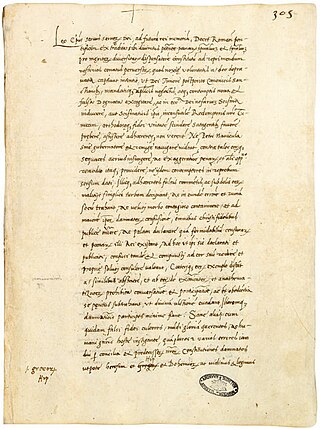Top Qs
Timeline
Chat
Perspective
Decet Romanum Pontificem
1521 papal bull excommunicating Martin Luther From Wikipedia, the free encyclopedia
Remove ads
Decet Romanum Pontificem (from Latin: "It Befits the Roman Pontiff") is a papal bull issued on 3 January 1521 by Pope Leo X to effect the excommunication of German theologian Martin Luther and some of his colleagues—notably Andreas Karlstadt—for refusing to recant forty-one of Luther's Ninety-five Theses, threatened by the earlier papal bull Exsurge Domine.[1] Luther had burned his copy of Exsurge Domine on 10 December 1520 at the Elster Gate in Wittenberg to indicate his response. The title Decet Romanum Pontificem comes from the first three Latin words of its text.[2]


There are at least two other important papal bulls with the title Decet Romanum Pontificem: one dated 23 February 1596, issued by Pope Clement VIII, and one dated 12 March 1622, issued by Pope Gregory XV.
Toward the end of the 20th century, Lutherans in dialogue with the Catholic Church requested the lifting of this excommunication, but the Roman Curia responded that its practice is to lift excommunications only on those still living. Roland Bainton, in "Here I Stand after a Quarter of a Century", his preface for the 1978 edition of his Luther biography, concluded: "I am happy that the Church of Rome has allowed some talk of removing the excommunication of Luther. This might well be done. He was never a heretic. He might better be called, as one has phrased it, 'a reluctant rebel.'"[3]
In 2008, a Vatican spokesman, the Jesuit Federico Lombardi, said "Rumors that the Vatican is set to rehabilitate Martin Luther, the 16th-century leader of the Protestant Reformation, are groundless."[4]
Remove ads
References
External links
Wikiwand - on
Seamless Wikipedia browsing. On steroids.
Remove ads
